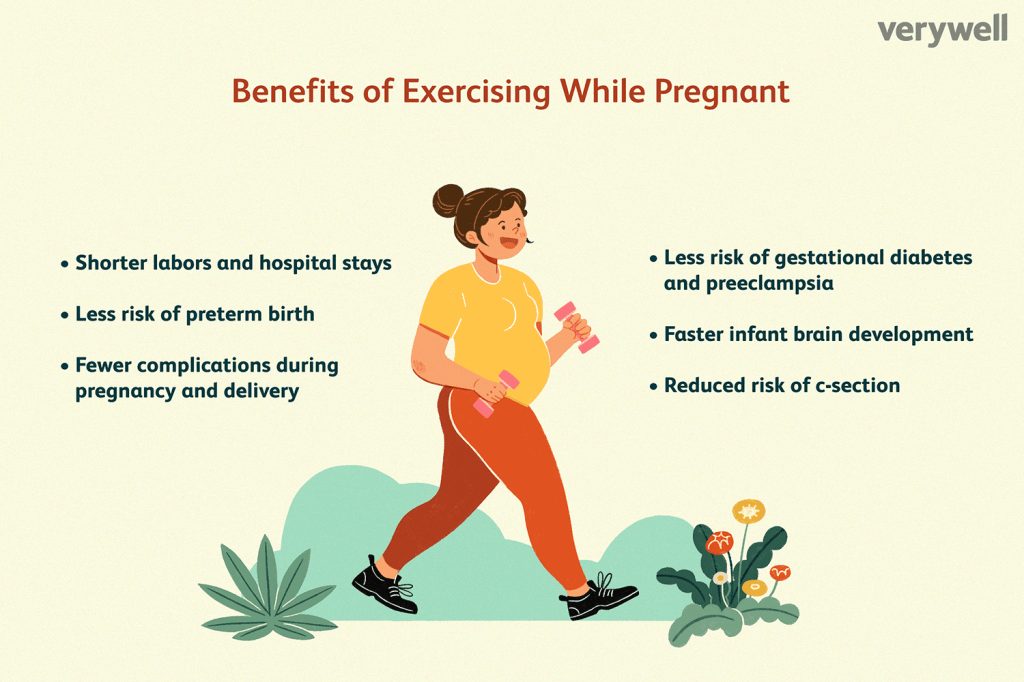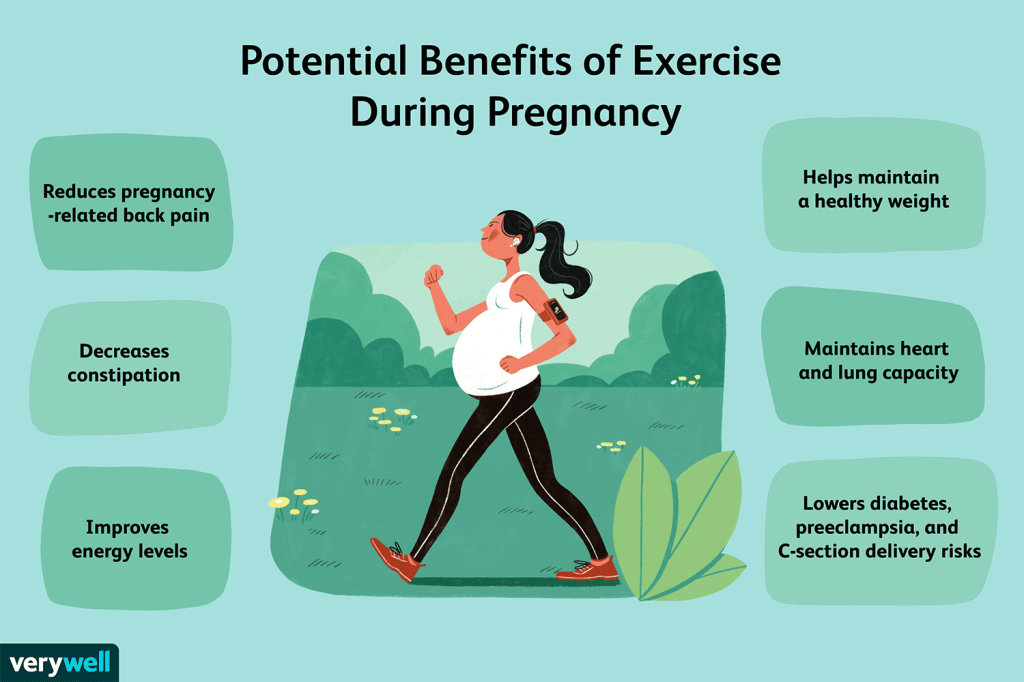Stay Fit And Healthy During Pregnancy: Essential Exercise Tips While Pregnant For A Happy Mom And Baby!
Exercise Tips While Pregnant
Introduction
Dear Readers,
2 Picture Gallery: Stay Fit And Healthy During Pregnancy: Essential Exercise Tips While Pregnant For A Happy Mom And Baby!


Welcome to this article where we will discuss exercise tips for pregnant women. Pregnancy is a beautiful journey, and staying active during this time can have numerous benefits for both the mother and the baby. However, it’s important to exercise safely and be aware of certain precautions. In this article, we will provide you with valuable information on exercise tips while pregnant, ensuring a healthy and enjoyable experience for you and your little one.
Table of Contents:

Image Source: verywellfit.com
1. What is exercise during pregnancy and why is it important?
2. Who can exercise during pregnancy?
3. When is the best time to start exercising?

Image Source: verywellfamily.com
4. Where can pregnant women exercise?
5. Why should pregnant women exercise?
6. How to exercise safely during pregnancy?
What is Exercise During Pregnancy and Why is it Important?
Exercise during pregnancy refers to any physical activity that gets your body moving and your heart rate up while pregnant. It is essential for maintaining overall health, managing weight gain, reducing pregnancy discomfort, and preparing your body for labor and delivery. Regular exercise can also improve mood, increase energy levels, and promote better sleep.
Benefits of Exercise During Pregnancy:
⭐️ Helps reduce the risk of pregnancy complications such as gestational diabetes and preeclampsia.
⭐️ Aids in managing weight gain and preventing excessive weight gain during pregnancy.
⭐️ Improves cardiovascular health and strengthens the heart and blood vessels.
⭐️ Enhances muscle tone, strength, and endurance, which can assist in carrying the weight of the baby and reduce back pain.
⭐️ Promotes better digestion and may alleviate common pregnancy discomforts like constipation and bloating.
⭐️ Boosts mood and reduces the risk of developing prenatal and postpartum depression.
⭐️ Helps prepare the body for labor and delivery by increasing stamina and endurance.
Who Can Exercise During Pregnancy?
Exercise during pregnancy is generally safe for most women with uncomplicated pregnancies. However, it is important to consult with your healthcare provider before starting any exercise routine, especially if you have any medical conditions or pregnancy complications. Generally, if you were physically active before pregnancy and have a healthy pregnancy, it is safe to continue exercising during pregnancy.
Exercise Precautions for Certain Conditions:
🔹 If you have a history of preterm labor or have been advised to limit physical activity, consult your healthcare provider for specific guidelines.
🔹 For women with certain medical conditions, such as heart disease, asthma, or diabetes, it is crucial to discuss exercise plans with your healthcare provider.
🔹 If you experience vaginal bleeding, dizziness, or severe shortness of breath during exercise, stop immediately and seek medical attention.
When is the Best Time to Start Exercising?
The best time to start exercising during pregnancy is in the first trimester. However, if you haven’t been physically active before pregnancy, it’s never too late to start. Begin with low-impact exercises and gradually increase the intensity as your body adapts. Remember to listen to your body and modify exercises if needed. Aim for at least 150 minutes of moderate-intensity exercise per week, spread out over several days.
Where Can Pregnant Women Exercise?
Pregnant women can engage in a variety of exercises, both indoor and outdoor, depending on their preferences and comfort levels. Here are some options to consider:
Indoor Exercises:
🔹 Prenatal yoga or Pilates classes
🔹 Stationary biking or cycling
🔹 Low-impact aerobics
🔹 Water aerobics or swimming
Outdoor Exercises:
🔹 Walking or brisk walking
🔹 Prenatal fitness classes
🔹 Low-impact hiking
🔹 Prenatal dance classes
Why Should Pregnant Women Exercise?
Regular exercise during pregnancy provides numerous benefits, including:
1. Enhanced Physical Well-being:
Regular exercise helps in maintaining physical fitness, improving muscle strength, and reducing pregnancy discomforts like back pain and swelling.
2. Improved Mental Health:
Exercise releases endorphins, also known as feel-good hormones, which can help reduce stress, anxiety, and promote better sleep.
3. Better Gestational Diabetes Management:
Physical activity can help regulate blood sugar levels and reduce the risk of developing gestational diabetes.
4. Easier Labor and Delivery:
Exercise helps strengthen the muscles needed for labor and delivery, making the process more manageable.
5. Faster Postpartum Recovery:
Women who exercise during pregnancy often have an easier time recovering postpartum, both physically and emotionally.
How to Exercise Safely During Pregnancy?
When exercising during pregnancy, it’s crucial to prioritize safety. Here are some guidelines to follow:
1. Warm-up and Cool Down:
Always begin with a warm-up session to prepare your body for exercise and end with a cool-down period to gradually lower your heart rate.
2. Stay Hydrated:
Drink plenty of water before, during, and after exercise to stay hydrated and prevent overheating.
3. Wear Comfortable Clothing:
Opt for loose-fitting, breathable clothing and supportive footwear to ensure comfort and minimize the risk of injuries.
4. Modify Exercises as Needed:
Listen to your body and modify exercises to accommodate your changing body shape and abilities. Avoid activities that involve jumping, bouncing, or sudden changes in direction.
5. Pay Attention to Warning Signs:
If you experience any pain, dizziness, shortness of breath, vaginal bleeding, or fluid leakage, stop exercising immediately and consult your healthcare provider.
Advantages and Disadvantages of Exercise During Pregnancy
Like any other aspect of pregnancy, exercise has its advantages and disadvantages. Let’s take a closer look:
Advantages:
⭐️ Promotes overall health and well-being for both the mother and the baby.
⭐️ Helps in managing weight gain and reducing the risk of excessive weight gain.
⭐️ Improves mood, reduces stress, and boosts energy levels.
⭐️ Enhances muscle strength and endurance, which can assist during labor and delivery.
⭐️ Reduces the risk of pregnancy complications like gestational diabetes and preeclampsia.
Disadvantages:
⭐️ Increases the risk of injury if exercises are performed incorrectly or unsafely.
⭐️ Some exercises may become uncomfortable or challenging due to the growing belly.
⭐️ Certain exercises, such as high-impact activities or contact sports, may pose a higher risk of falls or accidents.
⭐️ Excessive exercise or pushing yourself too hard may lead to exhaustion or dehydration.
⭐️ In rare cases, exercise may trigger preterm labor or complications in high-risk pregnancies.
Frequently Asked Questions (FAQs)
1. Can I start a new exercise routine during pregnancy?
It’s generally safe to start a new exercise routine during pregnancy if you have a healthy pregnancy. However, it’s important to consult with your healthcare provider before beginning any exercise program.
2. Are there any exercises I should avoid during pregnancy?
Avoid activities with a high risk of falling, such as skiing or horseback riding. Additionally, activities involving lying flat on your back after the first trimester should be avoided.
3. How often should I exercise during pregnancy?
Aim for at least 150 minutes of moderate-intensity exercise spread out over several days per week. It is generally safe to exercise every day if you feel comfortable. Listen to your body and rest when needed.
4. Can I lift weights during pregnancy?
Lifting weights is generally safe during pregnancy, but it’s important to use proper form and avoid heavy weights that strain your muscles. Consult with a qualified fitness professional for guidance.
5. Is it safe to exercise in hot weather while pregnant?
Exercising in hot weather can increase the risk of overheating and dehydration. It’s best to exercise in a cool, well-ventilated environment or opt for water-based activities like swimming.
Conclusion
Dear Readers, I hope this article has provided you with valuable information on exercise tips while pregnant. Staying active during pregnancy can have numerous benefits and contribute to a healthier and more enjoyable journey. Remember to always consult with your healthcare provider before starting any exercise routine and listen to your body throughout the process. Take care of yourself and your baby, and enjoy this beautiful phase of your life.
Final Remarks
Disclaimer: The information provided in this article is for educational purposes only and should not be considered medical advice. Always consult with your healthcare provider before starting any exercise program or making changes to your prenatal care routine.
This post topic: Fitness Tips

